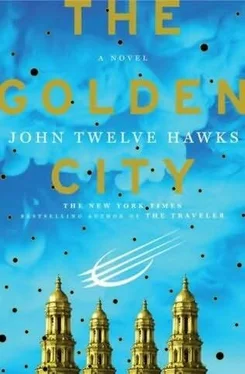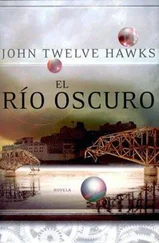As the dragonfly darted away, Cesar approached her carrying the dump truck. “Broke,” he said in English, and held up the toy.
“No. It’s all right. I can fix it.”
Ana turned the truck over and began to scrape sand away from the dumping mechanism. When she looked up again, Roberto and one of the boys had disappeared, but the third boy still lingered in the doorway.
The second boy came out of the park building, but Roberto wasn’t with him. A minute or so passed until the fear switch clicked in Ana’s brain. She stood up and asked the blond nanny to watch Cesar for a minute, please. She strolled past the swings to the dead grass. The two little boys had been standing near the doorway were coming toward her, but when she asked-”Where’s Roberto? Where’s my son?”-they shrugged their shoulders like they didn’t know his name.
She reached the open doorway of the park building and peered inside. The basketball room had a polished wooden floor and two baskets-a hollow room with echoes bouncing off the bare walls. Two half-court games were being played: one involved two teams of El Salvadorans, and the other game was between a group of teenage boys with bushy hair and slogans on their T-shirts.
“Have you seen my son?” She said in Spanish to an older El Salvadoran man. “He’s a little boy wearing a blue jacket.”
“Sorry. I didn’t see anyone,” the man answered. But his skinny friend stopped dribbling the basketball and approached her.
“He went out that door a few minutes ago. There’s a water fountain out there.”
Ana hurried down the center line of the basketball court as the games continued on either side of her. When she walked out of the doorway on the north side of the building she found a small parking lot and the street. Ana took a few steps forward and looked in every direction, but she couldn’t see her son.
“Roberto,” she said quietly, almost like a prayer, and then a feeling of panic overwhelmed her and she began to scream.
The first step in the sequence of events leading to Mrs. Brewster’s death was announced by a soft beep and a text message on Michael’s handheld computer. Mrs. Brewster was staying at Wellspring Manor House and a security guard there was watching her movements.
Michael was four thousand miles away from South England, sitting in one of the resident suites at the research center outside of New York City. Wearing a terrycloth bathrobe, he finished his coffee and read the message: Mrs. B. to Porthreath Airport this evening .
A spy program had been placed in all of Mrs. Brewster’s computers-Michael had been reading her email for the last three weeks. The moment he took control of the Evergreen Foundation, she had criticized his decisions and organized a small opposition group. In the Fifth Realm, Mrs. Brewster would have been torn apart on a public stage. But Michael didn’t want to cause dissent within the Brethren. Mrs. Brewster would die discretely, without a visible executioner.
Michael saw himself as an author creating different stories in countries around the world. Mrs. Brewster’s little story was about to end, but he had invented far more elaborate narratives. First there would be a criminal action or a terrorist attack, then a period of growing tension and instability. Finally, there would be a solution-offered by the Evergreen Foundation or one of their surrogates. The introduction of the Panopticon would give each story a happy ending.
In California, fourteen children were missing. In Japan, envelopes of anthrax had been sent to the Emperor and other members of the royal family. In France, a mysterious terrorist group had set off bombs in three major art museums. While these threats dominated the news cycle, three new stories would be introduced-in Australia, Germany and the Great Britain. The message of all these stories was simple and clear: there was no safe place in any country.
***
Michael took a shower, and then sent a reply to the guard at Wellspring Manor. Tell me when she leaves . When he was dressed, he strolled across the quadrangle to the Kennard Nash Computer Center. Michael had a full security clearance for every room in the building; sensors detected the Protective Link chip implanted beneath his skin and doors opened as if he owned the world.
He entered the lobby and Dr. Dressler hurried out to greet him. “It’s wonderful to see you, Mr. Corrigan. I was told that you might be leaving today.”
“That’s right. I’m flying to California to give a speech.”
Dressler led Michael into the control room, where Dr. Assad was studying graphs on a monitor. She pushed a lock of black hair beneath her head covering and smiled shyly. “Good afternoon, Mr. Corrigan.”
“I was told that our friends in the Fifth Realm had sent us some more data.”
Dr. Assad swiveled her chair around. “It’s a design for a radically new computer. The system is quite unlike anything in this world.”
“In the beginning, computers were simply computational,” Dressler explained. “Now they’re learning how to think like human beings. This would be the third evolution-a machine that would seem to be omniscient.”
“How is that possible?”
“In school we were taught that it’s impossible to calculate any phenomenon that involves a large number of factors. If a butterfly flaps its wings in the Amazon rain forest, then this slight disturbance in the atmosphere could conceivably trigger a long series of events that eventually becomes a hurricane. But this new machine has the power to simultaneously process an immense variety of factors. In some ways, it would have total knowledge.”
“So what’s the different between this computer and god?”
The two scientists glanced at each other. It was clear that they had discussed the idea. “God created us,” Dr. Dressler said softly. “This is just a machine.”
“Can you build one?”
“We’re assembling a design team,” Dr. Assad said. “Meanwhile there have been some new messages.” She motioned to a work station, and Michael sat down in front of a monitor. “As you can see, they want you to return to their world.”
“Unfortunately, I’m busy right now,” Michael said. “That’s not going to happen.”
His handheld computer beeped, and he read the text message: Mrs. B. in her car. Going to airport . When Michael was in England, he had taken a car from Wellspring to Portreath Airport. It took about an hour to get there. Quickly, he erased the message and called his driver.
“Get my luggage from the visitor suite, then contact the charter company at the airport. Tell them that I’m on my way.”
He was annoyed to see that Dr. Dressler was still hovering around the work station. The scientist was a like a child who desperately wanted to be invited to the party.
“They sent another message this morning, Mr. Corrigan. It’s there on the second page: Remember the story . What story are they talking about?”
“I described our current civilization to our new friends. It was clear to them that complicated ideas are no longer valued by our media or the general population. Take a look around you, Dr. Dressler. Is anyone reading political manifestos these days? How many people would sit still to listen to a lengthy, sensible speech about our current problems? This world is moving fast, and our consciousness has mirrored that reality.”
“But what’s the story we’re supposed to remember?”
“As ideas lose their power, stories and visual images become more and more important. Leaders offer competing stories, and this is what passes for political debate. Our friends are reminding me to create a powerful story. Let the tension build for awhile and then tell a new story that offers a solution.”
Читать дальше












